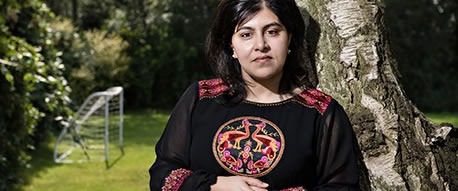Sayeeda Warsi Breaks Silence on Why She Had to Resign

(Guardian) The tipping point for Sayeeda Warsi came in the aftermath of one of the most notorious incidents of this year’s Gazan war: the killing of four Palestinian children by Israeli shells as they played football on the beach. Warsi hoped that David Cameron would condemn the attack as beyond the pale. Instead, she heard only the dry language of diplomacy.
Two months on, Warsi walks over to the lounge window of her home outside Wakefield and points at a set of goalposts in the back garden. “My kids go out there playing in their shorts, looking pretty much like those kids on the beach. It was too close to home; it made it very real.
“The lack of movement even in our [government’s] language …” Warsi’s voice trails off before she reconnects with the fury that made her resign after eight years in the shadow cabinet and on the frontbench, the first female Muslim cabinet minister. “I wasn’t naive enough to think we could resolve that matter but I did think we could be human enough to show compassion. Our inability to condemn that act in clear terms was a turning point.”
In her first major interview since stepping down, Lady Warsi, 43, the daughter of a businessman who emigrated from Pakistan as a mill worker – or in her words, “the girl from Dewsbury who ended up at the top table in the land” – says she has been relaxing since resigning in August as a Foreign Office minister, after criticising the government’s “morally indefensible” stance on Gaza.
It is soon evident, however, that much of her time has been spent grappling with one of the most intractable issues in geopolitics: the Middle East peace process.
She is at pains to describe how she thinks the government has lost “its moral compass” over the issue. Warsi understands the need for a nuanced diplomatic dialogue with Israel, but says Cameron’s government has been satisfied to pursue a “relationship for the sake of having a relationship” with Israel while being unwilling or unable to kickstart the stalled peace talks. Britain’s commitment to a negotiated two-state solution was, she says, starting to fade so rapidly that the “window had almost closed”.
She makes clear that she is far from an isolated voice within her party. Apart from Foreign Office officials and other senior Tories, Warsi identifies a wave of newer recruits who find the government’s approach misguided. “I see lots and lots of candidates coming through who are unhappy.” Does she regret her resignation? “Not at all, I’m not a career politician, I fell into politics in many ways. I was somebody who worked across issues and was quite prepared to work across parties to get those issues resolved. For me, politics is an opportunity to make a difference. If it becomes about protecting your own interests, there are better ways of earning an income than being in frontline politics.”
She says the realisation that the government had failed to put pressure on Israel to recognise Palestinian sovereignty and the collapse of last year’s negotiations led by US secretary of state John Kerry had started to depress her long before she left the Foreign Office. Towards the end of her ministerial tenure, she found the government’s line intolerable. “You are being asked to say things at the dispatch box that are fundamentally against what you believe. You could see I was uncomfortable, physically I looked uncomfortable at the dispatch box. I also felt like a cheat, putting down on record in history, in the form of Hansard, views I didn’t hold. I had to be prepared to step away from that.”
The importance of living with your decisions must be central to any politician, she says, leaning over the coffee table. It is plain that she believes some former high-ranking colleagues do not wrestle with such moral imperatives.
This self-described “northern mum with five kids” commands a large and potent constituency. Recent weeks have seen her strengthening those ties, sounding out views from across the Muslim community, including conservative figures whom the government had banned her from contacting as a minister.
In 2010 Warsi was named as one of the world’s “500 most influential Muslims” by the Middle East thinktank the Royal Islamic Strategic Studies Centre in Amman, Jordan. Her popularity, perhaps, can be measured by the fact that the tweet announcing her resignation was marked as a favourite on 17,000 accounts within hours.
She insists her resignation was not a knee-jerk response. The seeds of disaffection were sown when Britain chose not to officially recognise Palestinian statehood in November 2012, after the UN general assembly had approved recognition de facto. Britain merely indicated that it would start “serious negotiations” to push the peace process forward.
It never happened. The decision of former foreign secretary William Hague to stand down, a month before Warsi, robbed the department, she says, of ministerial experience and intellect and from there, things started “moving backwards.” Momentum to solve the Palestinian issue is now so flat that “there is no show in town”.
On domestic issues such as extremism and the government’s approach to counter-radicalisation, Warsi refuses to be drawn. “My argument is that extremists are more of a threat to British Muslims than the community as whole; not only do those people cause us harm like everybody else – they’re indiscriminate – but also the backlash. It’s a double whammy. British Muslims have more incentive to rid society of extremists.”
However, she says there is mounting concern among Muslim organisations that the government is failing to engage enough and build trust. “If the British government doesn’t keep the majority of the community on board then they are not helping resolve the issue.”
For her, the issue is how will Islam evolve and overcome an atmosphere of mistrust and misunderstanding towards it. “What will British Islam look like for my kids, grandkids? Chinese Islam is very different to Saudi Islam; the challenge for our times is how we find this place.”
In the immediate future, she says, the challenge is tackling the normalisation of anti-Islamic views among some, an Islamophobic mindset she referred to in 2011 as having “passed the dinner table test”.
Another concern is the threat to repeal the Human Rights Act and withdraw from the European convention on human rights. “I hope we don’t move away from our commitment to human rights, domestically and internationally. We have to be careful we aren’t seen as defenders of human rights overseas but behave differently at home.”
But there is some gratifying news for Cameron’s cabinet. Since she resigned, rumours have abounded that Warsi has kept a a warts-and-all diary that would be used to embarrass and expose Cameron’s upper-class coterie before next year’s election. Warsi says that, although there will be a book, such rumours are unfounded: “David and I have been in touch and he knows that they are no kiss-and-tell memoirs.” Her next career move is unclear, Warsi hinting only that she will be helping to campaign for greater religious freedoms.
She admits to being “nervous” about political life away from the frontline, but the Tories’ opponents know the party has lost a valued cabinet member. Not being white remains the single best predictor that somebody will not vote Conservative. Only 16% of ethnic minorities voted for the Tories in 2010.
Warsi was an antidote to assertions the Tories are not close to minority groups. Her resignation was never likely to mean her voice would be silenced. Now she is back, it might even be louder than before.



































